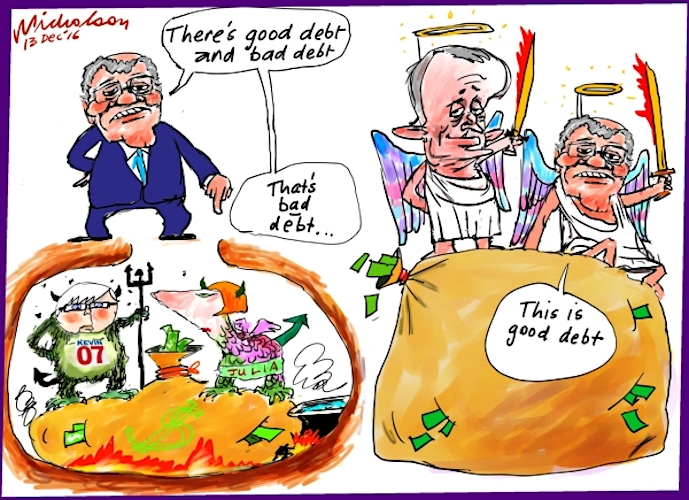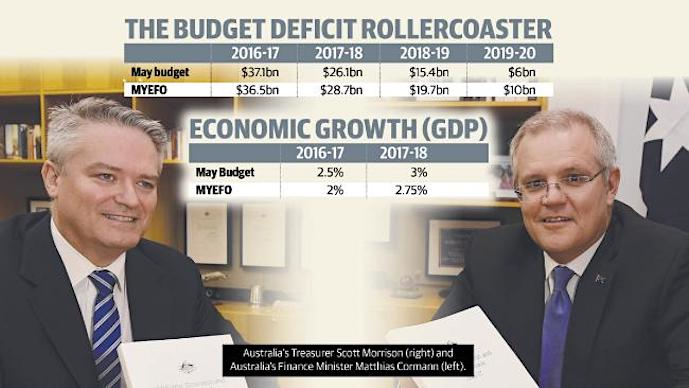
Who will ever forget the insults, the slurs, and the slander that the Coalition heaped upon Kevin Rudd, Julia Gillard and Wayne Swan as they managed the economy through the Global Financial Crisis and beyond? They were depicted as children playing games in their political sandpit with no idea of what they were doing, making one catastrophic mistake after another.
Remember how the Coalition boasted that the children should get out of the way and let the adults take over, insisting as they did that they were the experts at economic management. So convincing was the rhetoric that the electorate believed them and has consistently rated them as superior to Labor in economic management in opinion polls.
Recall the ‘debt and deficit disaster’, a mantra with which they assailed Labor for years. Remember the ‘intergenerational debt’ they accused Labor of accumulating.

Since their election in 2013 they have had their chance to show their much-vaunted expertise under the skilled management of Tony Abbott and Joe Hockey, and then Malcolm Turnbull and Scott Morrison, with Mathias Cormann a consistent shadowy presence. How have they done?
I am indebted to one of our most astute political commentators, Bernard Keane,
Crikey politics editor, for the best analysis I have read of the Coalition’s economic performance over the last four years. You can read it in its entirety in his article in the April 3 edition of
Crikey:
How the deficit was blown: The Coalition’s $100 billion bill. I have drawn heavily on Keane’s analysis and have quoted from it substantially. Here is an abbreviated version of it. Sit down before you read it, and have a tranquillizer handy.
Keane begins:
”Since its election in 2013, the Coalition has given away $46 billion in political decisions, and signed the Commonwealth up to $50-60 billion in long-term spending that will hammer the federal budget for decades to come. (My emphasis.)
“The 2013 Pre-Election Fiscal Outlook, produced independently by Treasury and Finance, forecast a return to surplus this financial year and net debt peaking last year at $219 billion.
“The Coalition’s first budget forecast a return to surplus in 2018-19 and net debt peaking at $264 billion.
In MYEFO at the end of 2016, the budget was forecast to be still $10 billion in deficit in 2019-20, when net debt would be $364 billion.
Can you believe that after their promise to return the budget to surplus this year, and their assurance that net debt would be confined to $219 billion last year, the ‘adults’ subsequently told us that the budget would not return to surplus until 2018/19, and later that in 2019/20 we would still have a $10 billion deficit and that net debt would balloon to $364 billion, twice as high as Labor’s deficit ever was! No wonder the ratings agencies are breathing down their necks! And they still claim that the situation would have been much worse had Labor still been in government!
While Keane acknowledges that much of the spectacular deterioration of the budget under the Coalition is due to revenue write-downs, he asserts that “
the government has worsened its own position through a series of political and ideological decisions that give the lie to its claims to be the victim of an irresponsible Senate”. He details the substance of those decisions as follows:
- an $8.8 billion gift to the Reserve Bank to make the 2013-14 budget deficit look worse, and earn future dividends for the government.
- Repeal of the carbon price cost the Commonwealth around $12.5 billion in lost revenue over the forward estimates and at least $1.8 billion per annum beyond that (based on a conservative estimate by the Climate Institute, lower than the government’s own estimate)
- The government’s company tax cuts agreed last week will cost $5.2 billion over the forward estimates.
- Repeal of the mining tax – despite the government’s claims that it raised no money – cost it $3.5 billion over the forward estimates, according to budget papers.
- The reversal of Labor’s changes to Fringe Benefits Tax reporting requirements to end the rorting of novated leases cost, by its own admission, $1.8 billion over the forward estimates.
- Income tax cuts for middle- and high-income earners cost $3.8 billion.
- The ineffective Emissions Reduction Fund so far is costing $2.55 billion, although the government has decided no further funding will be wasted on it.
- A Northern Australia Infrastructure Fund, established with no effective oversight, assessment or evaluation mechanisms and flagged as a funding source for unviable coal mining projects, will cost $5 billion.
- A National Water Infrastructure Development Fund established as a funding source for Barnaby Joyce’s obsession with building more dams, is costing $0.5 billion.
- A scheme to prop up dairy farmers threatening to desert the National Party, via the discredited means of concessional loans, is costing $0.55 billion.
- Australia’s continuing participation in Middle East military ventures has so far cost $0.72 billion since Tony Abbott sent Australian forces back to Iraq in the name of fighting the “existential threat” of ISIS.
- The government is spending $0.24 billion on a school chaplains program, although further funding has been halted for now.
- Nick Xenophon extracted an additional $0.37 billion worth of conditions as price for his support for company tax cuts last week.
Keane lists several significant costs beyond the forward estimates from a number of other government measures:
- The disastrous F-35 joint strike fighter program will cost taxpayers at least $17 billion over the period to 2023. There are new problems with the aircraft that are not being addressed or are worsening, and with no guarantees the cost will not escalate further.
- The government’s decision to reverse the Abbott government’s approach and construct the new generation of Royal Australian Navy submarines in Australia is expected to add up to 30% to the $50 billion cost of the program in order to provide less than 3000 jobs in South Australia.
- The company tax cuts agreed last week will cost $25 billion over ten years, although the government remains hopeful it can increase that cost to $50 billion! although there remains no evidence from anywhere in the world of any economic benefit from company tax cuts. (My emphasis)
- The continuing fiscal impact of some of the above measures beyond the forward estimates will cost the budget, on a conservative estimate, $6 billion per annum (unindexed)
.
Although some of the decisions were backed by Labor such as the submarines decision, which will cost the taxpayers many billions of dollars, the F-35 purchase, and the income tax cuts, “these decisions are in defiance of evidence, represent the triumph of ideology over reason, and in many cases were rankly political." (My emphasis)
Worse, some of them are likely to generate new waves of spending: the removal of an effective, cheap carbon price in 2014 created an energy policy vacuum that led directly to the current energy crisis and proposals from the government to spend billions of dollars re-entering the power generation industry.
Our military involvement in the Middle East looks set to increase, not decrease, in coming years.
The cost of poor decision-making will be borne by taxpayers for years, even decades, to come.” (My emphasis)
It would be hard to imagine a more condemnatory account of the Coalition’s ‘adult’ management of the nation’s economy in the four years since 2013. Its predictions have all been wrong. The ‘adults’ have steadily worsened the nation’s fiscal situation. The 2019-20 budget is projected to still be $10 billion in deficit, the promised surplus is nowhere in sight, and the nation’s net debt is projected to be $364 billion, twice as high as it ever was under Labor!
In an update in Crikey Weekender: Seven new terrible economic records ScoMo set in March - Scott Morrison has some new records to add to his quest to be known as Australia's worst treasurer reads: "The Office of Financial Management released figures last week showing gross borrowings at $484.6 billion. Of this, $58 billion is residue from the Howard government or its predecessors. Labor increased it by $212 billion. Another $214.6 billion has been added since the 2013 election. Hence the Coalition has now more than doubled Labor’s gross debt, in three years and six months. It doubled Labor’s net debt in January."

The unavoidable conclusion is that this ‘adult’ government is economically incompetent, driven by its conservative rump, quite unable to see its way through the nation’s economic difficulties, incapable of analyzing the economic situation, inept at deriving solutions, bereft of planning ability, and hog-tied by ideological constraints. Moreover, it is so unutterably arrogant that it cannot see its ineptitude. And even if it could, would it be capable of doing anything about it?
As a substitute for informed opinions, all we get is self aggrandizement and platitudes from Turnbull, and a torrent of meaningless drivel from the Coalition's two motor-mouthed financial Daleks: Morrison and Cormann.
How has it come to this with the adults in charge?
Current rating: 0 / 5 | Rated 0 times